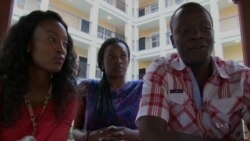President Barack Obama's Young African Leadership Iniative brought hundreds of young Africans to the United States for a six-week program aimed at building their knowledge and skills in fields such as public administration and business. Out of the 50,000 young Africans who applied for the program, just one percent was accepted.
At a townhall with program participants Monday, the president announced the program was being renamed in honor of Nelson Mandela.
"The spirit of this program reflects Madiba’s optimism, his idealism, his belief in what he called “the endless heroism of youth," President Obama said.
The initiative will now be known as the Mandela Washington Fellowship for Young African Leaders.
Intensive coursework is part of the six-week program. And the fellows are also visiting major U.S. corporations, volunteering at community-level organizations and meeting local government leaders.
Eric Ntumba of the Democratic Republic of Congo is studying public management at the University of Arkansas in the town of Fayetteville, where he got to meet Fayetteville’s mayor.
“We are learning from people who are already high-profile public servants or high profile political actors and that’s really, really interesting and insightful," Ntumba said.
A big part of the experience is the chance to meet and exchange ideas with other young African leaders who share their aspirations.
Sani Bello and Amina Ahmed, both from Nigeria, say this is an important achievement in the time they have spent as fellows at Howard University.
“We are from different countries but we are all thinking in the same direction: how do we develop our countries? How do we develop the continent?," they explained.
Amina and Sani are coming to the end of their stay in Washington. During a class at Howard University’s business school, students presented their ideas to one another.
Amina and Sani both said the business classes have been life-changing. But they say it’s the American spirit of volunteerism that they hope to put to use right away.
“Service leadership, giving to the community, paying it forward," they explained.
“Leadership is not just about leading. It’s also about serving," added Sani Dantuni Bellow, also a fellow.
Between classes and site visits, each of the Nigerian students had a chance to rest at their apartments and reflect on their experiences.
" I want to check my Facebook," confided Amina. "Education is power. With education you get liberated. With education you become empowered.”
“There are some things that we can do on our own to drive development," noted Sani.
After the VOA interview, the group headed to visit a Washington think tank. And soon they will travel back to Africa, and move forward toward their bright futures as Africa’s rising stars.





